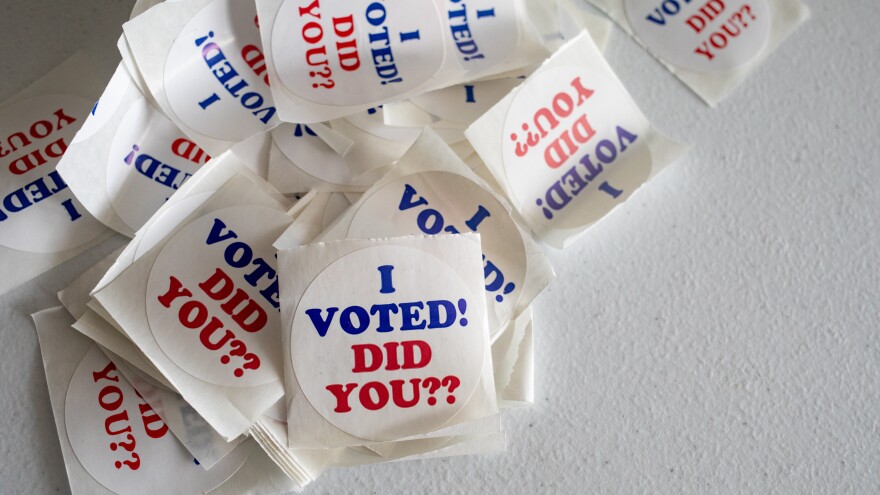Good morning. You're reading the Up First newsletter. Subscribe here to get it delivered to your inbox, and listen to the Up First podcast for all the news you need to start your day.
Today's top stories
Democratic and Republican voters in Michigan head to the primaries today. President Biden and former President Donald Trump are expected to win their parties' nominations. Still, opponents of Biden's support for Israel's war in Gaza are calling for Democrats to send a message by voting "uncommitted."
- NPR's Don Gonyea, who lives in Michigan, tells Up First that the disillusionment among voters is especially palpable in Arab and Muslim communities. He adds he used to hear people ponder a third-party vote during the general election but never during primary week. Dearborn Mayor Abdullah Hammoud, the first Arab American mayor of a majority Arab American city, tells Up First host Leila Fadel that his community is "not sizable enough to make a candidate win" but "sizable enough to make a candidate lose." Fadel reports that young people, progressives and particularly young Black voters she spoke to are also outraged and shared their worries over human rights in America.
- Negotiations for a temporary cease-fire in Gaza are ongoing. President Biden told reporters last night he hoped a deal could be announced by next Monday.
- See what photojournalists have captured on the ground this past week in Gaza, Israel and Lebanon.
An active duty U.S. Air Force member has died after he set himself on fire outside the Israeli Embassy in Washington, D.C., on Sunday. In a video leading up to the incident, Aaron Bushnell, 25, said it was an act of protest against Israel's war in Gaza and that he would "no longer be complicit in genocide."
- Oxford University sociologist Michael Biggs studies people who have died by self-immolation. He tells Morning Edition the "clearest parallel" to Sunday's incident is Norman Morrison, a Quaker who set himself on fire outside the Pentagon to protest the Vietnam War. Biggs adds these acts are different from other acts of self-harm because individuals are often acting on behalf of a political cause, and there are no clear instances of previous "psychological instability" in most cases. Self-immolation tends to have a bigger impact in countries outside the West, according to Biggs. In the West, it can often be seen as too extreme and "in a democracy, we see it as there are other ways of making your voice heard."
If you or someone you know may be considering suicide, contact the 988 Suicide & Crisis Lifeline by dialing 9-8-8 or the Crisis Text Line by texting HOME to 741741.
The Federal Trade Commission and nine states are suing to block the $24.6 billion merger of the two largest supermarket chains in the U.S. — Kroger and Albertsons. If they're combined, it would be the biggest U.S. grocery merger in recent history. Kroger owns stores like Ralphs, Harris Teeter, Fred Meyer and King Soopers. Albertsons, its top direct competitor, owns stores like Safeway, Vons and Jewel-Osco. The FTC argues the merger would eliminate competition for workers and shoppers.
- The companies say the merger is "existential to surviving in today's grocery business," NPR's Alina Selyukh reports. They say blocking the deal would only help its non-union national retail giants, including Walmart, Amazon and Costco. Selyukh adds that the case is interesting because it's the first time regulators will argue that mergers should not only protect consumers and prices but also workers.
Picture show

It's been two years since Russia invaded Ukraine. NPR photographer and visuals editor Claire Harbage has realized that life goes on for those in the middle of a long war. Harbage, sharing her experience of covering the war, contrasts the initial resilience and perseverance of the first year with the current sense of stagnation as people confront impossible choices for survival.
See photos of civilians in Ukraine living their day-to-day lives while a war rages in the background.
Deep dive

This Thursday is a leap day — an extra day that's added to the Gregorian calendar every four years (except for years divisible by 100, but not 400). The rules for leap years can be confusing, so Morning Edition asked experts in history, astronomy and economics to break down why we have leap days, the superstitions surrounding them, and an alternative calendar format.
- A year — or the amount of time it takes for the Earth to orbit the sun — is actually 365.242190 days. Leap Days account for the extra .242190 of a day.
- Many leap year superstitions revolve around marriage and love. An old Irish tradition says women can propose to men on leap day. In Greece and some other countries, it's unlucky to get married on leap day.
- Life can be tricky for leaplings — people with leap day birthdays. Some online forms don't recognize Feb. 29 as a valid birth date.
- An economics professor argues that our current calendar is confusing and proposes a new one that implements an occasional leap week at the end of the year, so the dates would be on the same day of the week every year.
3 things to know before you go

- Victor Glover was 10 years old when a televised space shuttle launch captivated him. He later became the first African American to spend an extended amount of time on the International Space Station. He'll soon be among the first humans to visit the moon in more than 50 years.
- Students at the Albert Einstein College of Medicine will receive free tuition after Ruth Gottesman, a chairperson of the college's board of trustees, donated $1 billion to the school.
- Much of the U.S. will be in the path of a total eclipse in April. A group of Harvard astronomers have created a sonification tool that turns the eclipse into sound so that people who are blind or have limited vision can experience the phenomenon too. (via Texas Standard)
This newsletter was edited by Majd Al-Waheidi. Mansee Khurana contributed.
Copyright 2024 NPR. To see more, visit https://www.npr.org.


